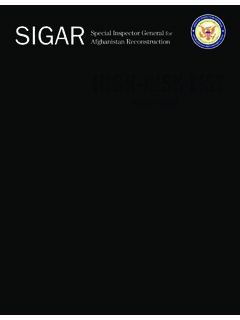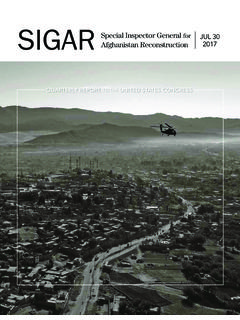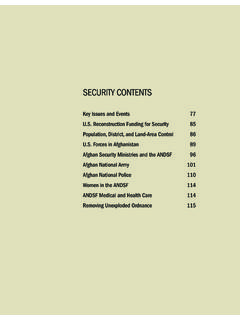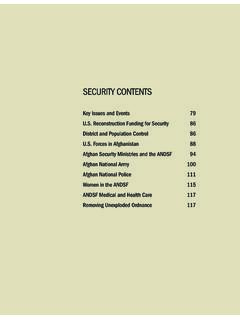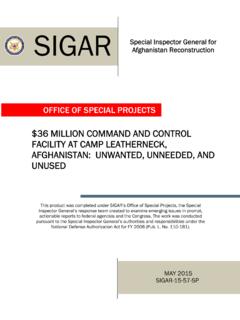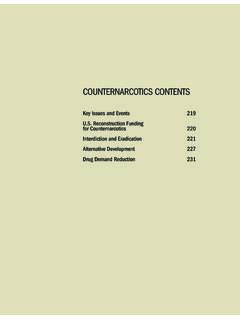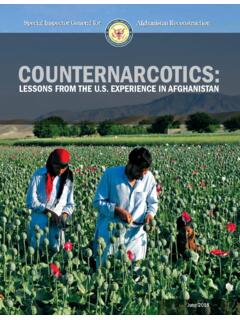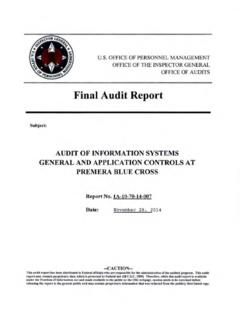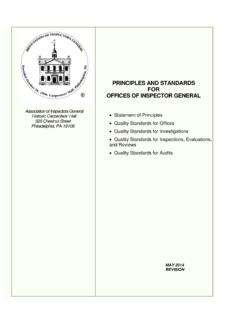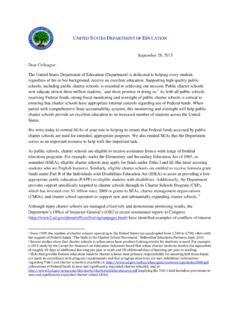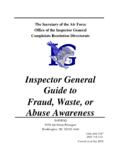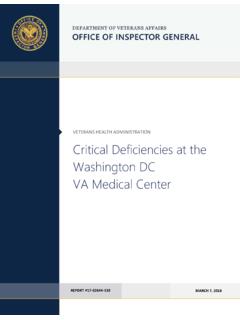Transcription of SIGAR
1 Special inspector general for Afghanistan Reconstruction C3 SIGAR 15-68 Audit Report Rule of Law in Afghanistan: Agencies Lack a Strategy and Cannot Fully Determine the Effectiveness of Programs Costing More Than $1 Billion SIGAR 15-68-AR/Rule of Law SIGAR J U L Y 2015 For more information, contact SIGAR Public Affairs at (703) 545-5974 or WHAT SIGAR REVIEWED Since 2003, the government, through the Departments of Defense (DOD), Justice (DOJ), and State (State), and the Agency for International Development (USAID), has worked to develop the rule of law in Afghanistan. This effort has focused on areas such as the judicial system, corrections system (detention centers and prisons), informal justice system, legislative reform, legal education, public outreach, and anticorruption efforts. The objectives of this audit were to determine the extent to which (1) the strategies and objectives guiding government support are current and have consistently defined the scope of rule of law assistance; (2) agencies can fully identify and account for government programs and funding; (3) current rule of law programs performance management systems are measuring progress made in achieving program objectives and in contributing to achieving strategic objectives; and (4) the government has encountered challenges in achieving its objectives and the extent to which it has addressed these challenges.
2 WHAT SIGAR RECOMMENDS This report contains four recommendations. SIGAR recommends that the Secretary of State, in coordination with other agencies managing rule of law programs in Afghanistan, ensure that a new strategy is finalized that includes an agreed-upon scope of activities and a plan to measure performance and performance metrics to evaluate progress in meeting strategy objectives. SIGAR also recommends that the Secretary of Defense require that components implementing future rule of law efforts track their activities and funding and report this information to the WHAT SIGAR FOUND efforts to develop the rule of law in Afghanistan have been impaired by four significant factors. First, agencies lack a comprehensive rule of law strategy to help plan and guide their efforts. Second, DOD is unable to account for the total amount of funds it spent to support rule of law development. Third, DOD, DOJ, State, and USAID all have had problems measuring the performance of their respective rule of law programs.
3 Fourth, efforts are undermined by significant challenges from pervasive corruption in Afghanistan s justice sector and the uncertainty regarding whether the Afghan government can or will sustain program activities and reforms. agencies led by DOD, DOJ, State, and USAID lack a current, comprehensive interagency rule of law strategy to help plan and guide rule of law development efforts in Afghanistan. State issued the first interagency strategy in September 2009 (2009 strategy) to guide efforts in the formal and informal justice systems. Although State, in its capacity as coordinator for developing and approving agencies foreign assistance strategies, is working to finalize a new strategy, it will be less robust than the Rule of Law Strategy for Afghanistan approved in September 2009. However, Embassy Kabul officials told SIGAR that by 2012, the 2009 strategy no longer reflected the operating environment or available resources, was over-ambitious, and, as a result, had become outdated.
4 In June 2013, the embassy drafted a new strategy. However, the draft strategy has not yet been approved by State or formally vetted by other agencies involved in rule of law development. The embassy s draft 2013 strategy is less extensive than the previous 2009 strategy. For example, embassy officials told us that the 2013 draft strategy does not include monitoring and evaluation components intended to help determine if strategic objectives are being achieved. Unlike the 2009 strategy, which contained 27 specific performance measures, the 2013 draft strategy contains no performance measures. In accordance with State and USAID s 2010 Quadrennial Diplomacy and Development Review, State and USAID guidance states that the agencies must incorporate analysis and evidence into strategies and build and assess these strategies on clear performance metrics and high-quality evaluations in order to provide information about the success or failure of strategies against their objectives.
5 The 2013 draft strategy lacks these important measures. Without an approved strategy in place, efforts may not be properly coordinated across agencies, monitored for alignment with and Afghan development goals and objectives, or managed effectively to ensure proper expenditure of taxpayer monies. In addition, DOD, DOJ, State, and USAID did not have a clear and consistent agreed-upon description of the scope of activities that constitute rule of law assistance. Officials from DOJ, State, and USAID told SIGAR they are not required to have one agreed-upon definition of the scope of activities they plan to conduct. Although the 2009 strategy defined a scope, DOD, DOJ, State, and USAID continued to have varying activities they considered to fall under rule of law assistance. SIGAR determined that DOD, DOJ, State, and USAID have spent more than $1 billion on at least 66 programs since 2003 to develop the rule of law in Afghanistan. The Coordinating Director at the embassy in Afghanistan is responsible for decisions regarding how civilian agencies use funds appropriated for rule of law programs in Afghanistan.
6 As a SIGAR Special inspector general for Afghanistan Reconstruction July 2015 Rule of Law in Afghanistan: Agencies Lack a Strategy and Cannot Fully Determine the Effectiveness of Programs Costing More Than $1 Billion SIGAR 15-68 AUDIT REPORT For more information, contact SIGAR Public Affairs at (703) 545-5974 or Secretary of State, in recognition of State s capacity as lead coordinator of rule of law development assistance in Afghanistan. In addition, SIGAR recommends that the Secretary of Defense, the Attorney general , the Secretary of State, and the USAID Administrator, taking into account the challenges to measuring performance in Afghanistan, revise performance management plans for ongoing rule of law programs and develop and implement plans for planned or future programs that include appropriate performance indicators, baselines, and targets, and ensure program progress is consistently monitored and reported. Finally, SIGAR recommends that the Secretary of Defense, the Attorney general , the Secretary of State, and the USAID Administrator assess whether ongoing and future rule of law programs are sustainable and determine whether and how those programs will be continued.
7 If programs are to be continued or new programs are to be initiated, the agencies should obtain Afghan government commitment to help support them through a formal, written agreement prior to the expenditure of taxpayer funds. SIGAR received comments from DOD and DOJ, and joint comments from the Embassy Kabul and the USAID Mission for Afghanistan. DOD partially concurred with our recommendations, and DOJ concurred. Embassy Kabul and the USAID Mission for Afghanistan concurred with two recommendations and did not concur with one recommendation. consequence of the Coordinating Director s responsibility for such decisions, DOJ, State, and USAID are required to report to the embassy on their funding for rule of law programs. The three agencies were able to identify the rule of law activities they conducted and account for the funding spent since 2003 in response to SIGAR s request. Although SIGAR identified more than $1 billion spent by agencies on rule of law programs in Afghanistan since 2003, this amount does not represent the total spent because DOD could not provide us complete funding figures, such as obligations or expenses, for the Rule of Law Field Force Afghanistan (ROLFF-A), even though this sub-command of the Combined Joint Interagency Task Force 435 (CJIATF-435) had a dedicated rule of law mission.
8 DOD officials also told SIGAR that many of the department s rule of law activities were not tracked as part of a specific rule of law program. Consequently, DOD could not account for the total amount of funds it has spent to support rule of law development in Afghanistan, and likely performed more activities and spent more than the $ million it reported to SIGAR . SIGAR reviewed 6 of the 66 completed and ongoing rule of law programs, which totaled at least $635 million ( , 59 percent of the total amount of funding spent on rule of law programs since 2003) and covered all four funding agencies ( , DOD, DOJ, State, and USAID): (1) DOD s ROLFF-A, (2) DOJ s Senior Federal Prosecutors Program, (3) State s Corrections System Support Program (CSSP), (4) State s Justice Sector Support Program (JSSP), and (5) USAID s Rule of Law Stabilization Program Formal and (6) Rule of Law Stabilization Program Informal Components. The four agencies each have guidance calling for them to establish a performance management system for monitoring and reporting on each program s progress toward achieving its objectives.
9 However, SIGAR found problems with all six programs performance management systems, which make the extent to which the programs achieved all of their objectives unclear. For example, State s CSSP, which cost approximately $ million, lacked a performance management plan, as called for by State, until October 2012 over 6 years after the program had started and only in March 2014 was an adequate plan for measuring program performance outputs and outcomes created. Because DOD, DOJ, State, and USAID did not systematically measure and report on their programs achievements, it remains unclear what overall outcomes and impact have resulted from the expenditure of more than $1 billion to develop the rule of law in Afghanistan. Two major challenges continue to undermine efforts to develop the rule of law in Afghanistan: (1) the pervasive corruption in Afghanistan s justice sector, and (2) the uncertainty regarding whether the Afghan government can or will sustain program activities and reforms.
10 DOD, DOJ, State, and USAID officials at the Coordinating Directorate s office have been aware of these challenges and have taken steps to address them. For example, according to officials from the Coordinating Directorate s office, the agencies have made efforts in the past to reduce corruption within the justice sector. However, DOD, DOJ, State, and USAID officials and rule of law experts told us that anticorruption efforts have not been successful because, among other things, the Afghan government has lacked the political will and commitment to tackle corruption in the justice system. In addition, the Consolidated Appropriations Act, 2012, Pub. L. No. 112-74 (2011), calls for State and USAID to consider the sustainability of reconstruction programs in Afghanistan. However, officials from these agencies told us they do not know whether the Afghans will be able to continue the work, and they raised concerns with some specific rule of law programs.

